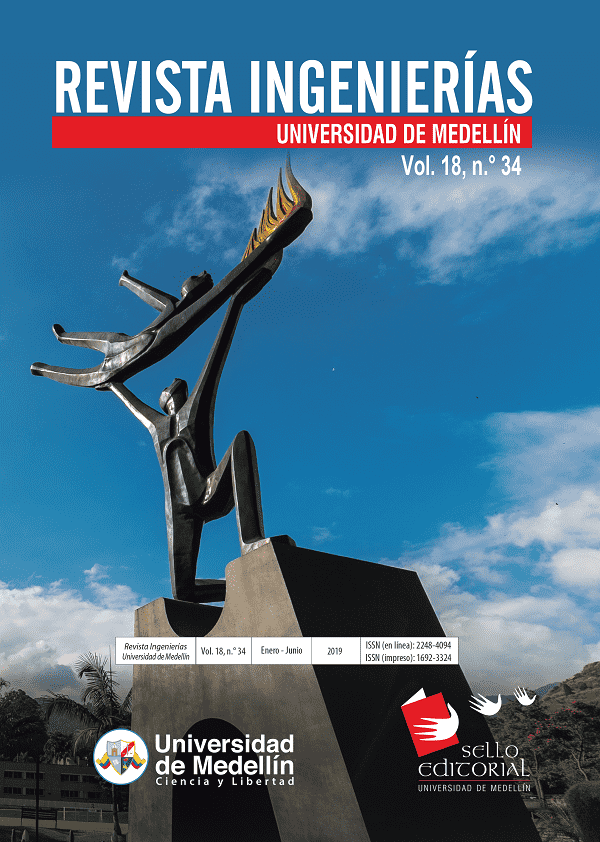Optimización del ancho de banda en redes BPL usando las técnicas nucleolus y max-min fairness
Contenido principal del artículo
Resumen
Las redes BPL (Broadband Power Line) operan bajo el estándar HomePlug AV (HPAV) el cual utiliza las tecnologías CSMA/CA y TDMA como mecanismo de acceso al medio, donde CSMA/CA está destinado para la transmisión de paquetes de datos y TDMA se utiliza para la transmisión de paquetes de voz y video, con el fin de ofrecer adecuados niveles de QoS. Sin embargo, pese a que el HPAV puede alcanzar altas tasas de transmisión, no cuenta con un adecuado mecanismo de asignación de ancho de banda (AB), lo cual afecta considerablemente el rendimiento de la red a medida que aumenta el número de usuarios debido a que únicamente un nodo puede transmitir a la vez. De acuerdo a lo planteado y, considerando que una red BPL puede ser representada como un juego cooperativo de utilidad transferible (UT), en el presente artículo se propone el uso de dos técnicas para la asignación equitativa de ancho de banda: nucleolus y max-min fairness, las cuales forman parte de la teoría de juegos cooperativos. Al realizar el comparativo de las técnicas nucleolus y max-min fairness como estrategia para la asignación de recursos, se encontró que esta última genera los mejores resultados. Además, se pudo evidenciar que la teoría de juegos puede ser considerada como una novedosa estrategia para la optimización de recursos en una red LAN sobre BPL.
Detalles del artículo
Citas
[1] N. Anatory y J. Theethayi, Broadband Power-Line Communication Systems: Theory and Applications, Londres: WIT Press, 2010.
[2] H. Latchman et al., Homeplug AV and IEEE 1901: A Handbook for PLC Designers and Users, Nueva Jersey: Wiley-IEEE Press, 2013.
[3] S. Goldfisher y S. Tanabe, 'IEEE 1901 access system: An overview of its uniqueness and motivation,' IEEE Commun. Mag., vol. 48, n.° 10, pp. 150-157, Oct. 2010.
[4] S. Galli et al., 'For the Grid and Through the Grid: The Role of Power Line Communications in the Smart Grid,' Proc. IEEE, vol. 99, n.° 6, pp. 998-1027, 2011.
[5] E. V. Rogozhnikov et al., 'Full-duplex power line communication system. Analog cancellation, system concept and implementation problems,' presentado en 2018 Moscow Workshop on Electronic and Networking Technologies (MWENT), pp. 1-5, 2018.
[6] A. Mengi et al., 'The ITU-T G.9960 broadband PLC communication concept for smartgrid applications,' presentado en 2017 IEEE International Conference on Smart Grid Communications (SmartGridComm), pp. 492-496, Dresden, 2017.
[7] J. Pérez et al., Teoría de juegos, Madrid: Pearson-Prentice Hall, 2003.
[8] M. Seijo et al., 'Planning and Performance Challenges in Power Line Communications Networks for Smart Grids,' Int. J. Distrib. Sens. Networks, vol. 12, n.° 3, pp. 1-17, 2016.
[9] B. Peleg y P. Sudhölter, Introduction to the theory of cooperative games, Berlín: Springer, 2007.
[10] A. Loni y F.A. Parand, 'A survey of game theory approach in smart grid with emphasis on cooperative games,' presentado en 2017 IEEE International Conference on Smart Grid and Smart Cities (ICSGSC), 2017, pp. 237-242, Dresden, 2017.
[11] M. Hajir et al., 'Solidarity-based cooperative games for resource allocation with macro-users protection in HetNets,' presentado en 2016 IEEE International Conference on Communications (ICC), pp. 1-7, Kuala Lumpur, 2016.
[12] P. Berens, 'CircStat: a MATLAB toolbox for circular statistics,' J. Stat. Softw., vol.31, n.° 10, pp. 1-21, 2009.
[13] X. Huang y B. Bensaou, 'On max-min fairness and scheduling in wireless ad-hoc networks: analytical framework and implementation,' presentado en Proc. 2nd ACM Int. Symp. Mob. ad hoc Netw. Comput., Long Beach, 2001.
[14] Y. Sheng y M. H. MacGregor, 'Dynamic Resource Allocation Based on Weighted Max-Min Fairness,' presentado en Communication Networks and Services Research Conference (CNSR), 2011 Ninth Annual, pp. 247-256, Ottawa, 2011.
[15] E. L. Hahne, 'Round-robin scheduling for max-min fairness in data networks,' IEEE J. Sel. Areas Commun., vol. 9, n.° 7, pp. 1024-1039, 1991.
[16] J. Chen et al., 'A local fairness algorithm for the MetaRing, and its performance study,' presentado en [Conference Record] GLOBECOM ’92 - Communications for Global Users: IEEE, pp. 1635-1641, Orlando, 1992.
[17] J. S.-C. Chen, et al., 'A local fairness algorithm for gigabit LAN’s/MAN’s with spatial reuse,' IEEE J. Sel. Areas Commun., vol. 11, n° 8, pp. 1183-1192, 1993.
[18] D. Schmeidler, 'The Nucleolus of a Characteristic Function Game.' SIAM J. Appl. Math., vol. 17, n.° 6, pp. 1163-1170, 1969.
[19] I. Curiel, Cooperative game theory and applications: cooperative games arising from combinatorial optimization problem, Dordrecht: Kluwer Academic Publishers, 1997.
[20] D. Nace et al., 'A tutorial on max-min fairness and its applications to routing, load-balancing and network design,' presentado en 4th IEEE Int. Conf. Comput. Sci. Res. Innov. Vis. Futur., p. 30, Santa Bárbara, 2006.
[21] F. Canete, 'User guide for PLC channel generator v.2,' Septiembre 2011. [En Línea]. Disponible: http://www.plc.uma.es/channel_generator/User_guide_v2.pdf
[22] P. J. Pinero-Escuer et al., ' Homeplug-AV C SMA/CA C ross-Layer E xtension for Q oS Improvement of Multimedia Services,' IEEE Commun. Lett., vol. 18, n.° 4, pp. 704-707, 2014.
[23] R. Walpole et al., Probabilidad y estadística para ingenieros. Ciudad de México: Pearson-Prentice Hall, 2007.





